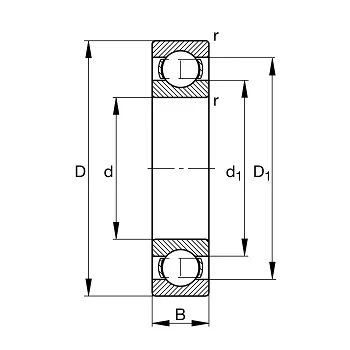Nov . 11, 2024 12:52 Back to list
single row deep groove bearing manufacturers
Understanding Single Row Deep Groove Bearing Manufacturers
Single row deep groove ball bearings are a fundamental component in various mechanical applications, known for their versatility and reliability. With increasing demands for efficiency and performance in industrial machinery, the role of manufacturers specializing in these bearings has never been more critical. This article delves into the world of single row deep groove bearing manufacturers, exploring their importance, the manufacturing process, and the factors influencing quality and performance.
Importance of Single Row Deep Groove Bearings
Single row deep groove ball bearings are among the most widely used types of bearings in modern machinery. Their design features a basic deep groove shape that allows them to accommodate radial and axial loads in both directions. This versatility makes them suitable for a wide range of applications, from electric motors and automotive components to household appliances and industrial machines.
Manufacturers of these bearings play a pivotal role in ensuring that engineers and manufacturers across various industries can access reliable and high-performance components. The effectiveness of machinery often hinges on the quality of the bearings used, making it essential to choose a reputable manufacturer.
The Manufacturing Process
The production of single row deep groove ball bearings involves several critical steps, each requiring precision and attention to detail. Here’s an overview of the typical manufacturing process
1. Material Selection The first step in manufacturing bearings is selecting high-quality materials. Most deep groove ball bearings are made from high carbon chromium steel, which provides the necessary hardness and wear resistance. Stainless steel and other specialized materials may also be used for specific applications.
2. Forging and Machining Once the materials are selected, they undergo forging or machining to create the inner and outer rings as well as the ball elements. This process defines the bearing's dimensions and surface finish, which are crucial for optimal performance.
3. Heat Treatment To enhance the hardness and wear resistance of the bearing components, heat treatment is performed. This process involves heating the components to specific temperatures and then cooling them to achieve the desired mechanical properties.
4. Assembly After the components are treated, they are assembled. The balls are placed between the inner and outer races, and cages are sometimes used to keep the balls evenly spaced. Proper assembly is critical to ensure smooth operation and minimize friction.
single row deep groove bearing manufacturers

5. Quality Control Rigorous testing and inspection are conducted at various stages of production. Measurements for dimensional accuracy, surface finish, and load capacity are essential to ensure that the bearings meet industry standards and customer expectations.
6. Packaging and Distribution Finally, once the bearings have passed all quality checks, they are packaged for distribution. Manufacturers often provide detailed product specifications, including load ratings and operational limits, to help customers make informed choices.
Factors Influencing Quality and Performance
Several factors can impact the quality and performance of single row deep groove bearings. Manufacturers must focus on
- Material Quality The use of high-grade materials significantly affects the longevity and performance of bearings. Manufacturers that prioritize raw material quality tend to produce more reliable products.
- Precision Engineering Tight tolerances and precision machining are essential for ensuring that bearings operate smoothly and efficiently. Any deviation can lead to increased friction, heat generation, and premature failure.
- Innovation The bearing industry continues to evolve with advancements in technology. Manufacturers that invest in research and development can create bearings that not only meet current demands but also adapt to future challenges.
- Customer Feedback and Adaptability Engaging with customers and adapting to their needs is vital for manufacturers. By understanding the specific requirements of various applications, manufacturers can tailor their products accordingly.
Conclusion
Single row deep groove bearing manufacturers play a crucial role in the machinery and manufacturing industries. Their commitment to quality, precision, and innovation ensures that industries have access to reliable components that enhance efficiency and performance. As technology advances and demands evolve, these manufacturers will continue to be at the forefront, providing solutions that drive progress in mechanical engineering and beyond. By understanding the manufacturing processes and factors influencing the quality of these bearings, engineers and purchasing managers can make informed decisions that benefit their operations and projects.
Latest news
-
25MM 2 BOLT UCFLX05-14 Flange bearing unit( oval)
NewsMar.07,2025
-
4 bolt UCF 200 series Pillow block bearings
NewsMar.07,2025
-
25MM 2 BOLT UCFLX05-14 Flange bearing unit( oval)
NewsMar.07,2025
-
UCF216-50 4-Bolt Flange Housing Square Bearing
NewsMar.07,2025
-
25MM 2 BOLT UCFLX05-14 Flange bearing unit( oval)
NewsMar.07,2025
-
spherical roller bearing material exporter
NewsMar.07,2025





